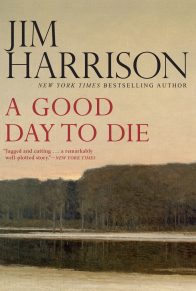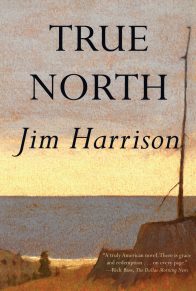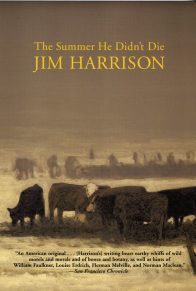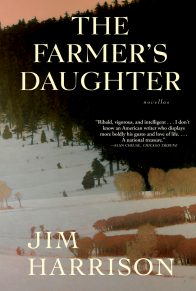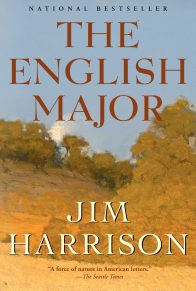“[Harrison’s] books glisten with love of the world, and are as grounded as Thoreau’s in the particulars of American place—its rivers and thickets, its highways and taverns. Bawdily and with unrelenting gusto, Harrison’s 40 years of writing explores what constitutes a good life, both aesthetically and morally, on this planet. . . . Quietly magnificent . . . A luminous, sad calm pervades this novel. . . . [An] extraordinary valediction to mourning. It sharpens one’s appetite for life even at its darkest.” —Will Blythe, The New York Times Book Review
“Time, memory, and the land all play key roles in Harrison’s remarkable new novel. . . . A deeply felt meditation on life and death, nature and God, this is one of Harrison’s finest works.” —Library Journal (starred review)
“Jim Harrison is a writer with a bear in him. Fearless, a top predator, omnivorous, he consumes all manner of literature and history and philosophy while walking the North Woods, fishing in streams or driving the back roads of North America . . . He is one of the great writers of our age for the muscularity of his prose; his strong, declarative sentences boom one after the other like waves pounding a Lake Superior shore, each carrying some new flotsam from the conscious or unconscious worlds.” —Jim Lenfestey, Minneapolis Star-Tribune
“Wrenchingly sad. . .” —Charles McGrath, The New York Times
“[Harrison] offers . . . roomy definition of integrity endlessly open to interpretation and based on relationships with the earth, with one’s family, with oneself. Locating ourselves in the four directions, in the march of ancestors, in the web of species, Harrison means to tell us, might help us feel safer, which would make us kinder and less destructive. . . . Although these characters share a common heritage and interests, they remain so distinct, so memorable, that you would recognize their voices in a crowded bar, even if you had your back to them. As for the places they love and inhabit, the chokecherry and dogwood and porcupine-quill baskets and feathers and stones—well, let’s just say that all five senses were used to re-create them.” —Susan Salter Reynolds, The Los Angeles Times
“Beautifully written . . .” —Ashley Simpson Shires, Rocky Mountain News
“Beautiful, complex and . . . heart-wrenching. . . . Really . . . really, Harrison is one of the most remarkable writers on the planet. He is one of the few who can write a book about death and dying that is at once dignified, uplifting and hilarious, without a trace of mawkishness or sentimentality. . . . On every page of a Harrison novel are revelatory gems of seemingly off-handed wisdom. . . . It is useless to catalog the wisdom on every page of Returning to Earth, except to say that like great poetry, Harrison’s prose has the power to stop the eye and the mind at the same time, to suspend a reader in an absolute moment of contemplation, and to tear away the junk of the world, revealing only what our deepest nature desires, peace and contentment. . . . Redemption and courage flow from Harrison’s heart to ours. We’re lucky to have him. He’s a genuine treasure, an American writer who deserves the Nobel Prize for Literature.” —Gaylord Dold, The Wichita Eagle
“For more than four decades his sinewy prose and poetry have been exhorting us—without timidity—to embrace life in all its sensuality. Now, with his splendid new novel, [Harrison] delivers a treatise on love, loss, and longing, and reminds us that such embarrassment can compromise our lives while we yet live. . . . This should not be mistaken as an endorsement of ‘closure’ that false sedative to which we, in our instant-gratification society, seem addicted. Harrison fairly thumbs his nose at that hollow concept. He knows that yearning outlives acceptance. His point is more profound.” —Craig L. Smith, Santa Fe New Mexican
“Mr. Harrison [is] one of the finest American writers of the last half-century. . . . Mr. Harrison . . . writes with great beauty and power about nature and the outdoors. . . . This is a major book by a major writer working at the top of his powers. Don’t miss it.” —John Greenya, The Washington Times
“Harrison is a companionable writer whose best work reads like a long conversation with an eccentric friend. In Returning to Earth, the anecdotes within the larger narrative have the drift of oral language and the texture of the oft-repeated tales good buddies exchange when they reconnect after a long absence. . . . The sort of speaker most people can listen to for hours.” —Joe Campana, The Missoula Independent
“At the center of the novel, the irreducible conundrum: What matters after life is stripped away? That is the question. It is not an easy question and it is the question we most often look away from, in a culture swept up in the distractions of the everyday. Be kind, Harrison might say by way of a sideways answer. Be true and be kind.” —Ft. Lauderdale Sun-Sentinel
“Harrison offers a . . . view of death and redemption that is as earthbound and humble as it is spiritual and profound.” —Tim McNulty, The Seattle Times
“[Jim Harrison] has become a major figure in American literature, and nowhere are the reasons for that more clear than in his newest novel, Returning to Earth. . . . Returning to Earth is . . . a prodigious achievement. It is both familiar and strange, rooted and rootless, endlessly dark and occasionally hilarious. It is above all human: raucous, literary, bawdy, goofy and wise. It is heartbreakingly sad. And it registers the redemption of love, the power of the word to speak the truth, the peace that comes to those who live even when it is time to die.” —Bart Thurber, San Diego Union-Tribune
“Harrison’s characters speak with a gripping frankness and intimacy about their own shortcomings, and delve into their grief with keen sympathy.” —Publishers Weekly
“Returning to Earth is a poignant and powerful reflection of how all stories become one in the end . . . a story told with bare-bones honesty and simple eloquence.” —David Nolt, Livingston Weekly
“[Jim Harrison’s] fiction is rooted in primitive feelings of earthy connectedness and the mystical bonds shared by human beings and nature, or that could be shared were not our innocence corrupted by greed and unholy aspiration.” —Fredric Koeppel, The Commercial Appeal
“Readers will find Returning to Earth both substantial and nourishing . . . Robust, soulful, satisfying, Returning to Earth is a reminder of the death-defying power of deep and abiding love.” —Kathleen Johnson, Kansas City Star
“Each section of this brilliant novel set in the Upper Peninsula of Michigan is told from the perspective of a different character dealing with loss and love. I think this is one of the best novels I’ve read in months, and if you’re discovering Jim Harrison for the first time, this is a great book to get you started on his work.” —Gayle Shanks, Changing Hands Bookstore, Tempe, AZ, Book Sense quote
“Harrison’s newest novel, Returning to Earth, contains some of the most poignant moments he has ever imagined.” —Daniel Dyer, Cleveland Plain Dealer
“Grade: A. . . . Returning to Earth is a beautifully written account of one man’s passing and the effect on his multifaceted and multicultural family.” —Ashley Simpson Shires, Rocky Mountain News
“[Returning to Earth] is told in a prose so pure and scraped of excess that a paragraph can seem a novel, a sentence a poem. . . . Breathtaking.” —Ted Roelofs, The Grand Rapids Press
“Deeply moving . . .” —Book Passage
“A wise and moving story about life, death, and letting go.” —The Octavian
“Returning to Earth (another wonderful title from an author who understands their importance) is best at the level of the sentence and the paragraph, which is where Harrison’s prose most shines. As a poet, he is especially attentive to the power of single words . . . there is much to be said in praise of this quiet reflective work that presents an ordinary life in its final state of repose. Here we will all go in the end, and Jim Harrison has traveled that future length of the trail for us. . . . The novel reaffirms his dedication to the craft and the persistence and clarity of his vision.” —The Bloomsbury Review
“Jim Harrison is a rare find. His characters are so skillfully rendered that they become real to the reader—self-conscious, spontaneous and imperfect. Harrison’s voice is direct and brutal, bringing to light the parts of ourselves that we try to keep hidden, and the tiniest thought we leave unsaid.” —Bridget Randles, Albuquerque Journal





